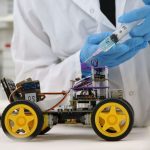Breaking Barriers: Israeli Algorithm Offers Swift and Cost-Effective Antibody Humanization
Jerusalem, 5 February, 2024 (TPS) -- In a significant breakthrough, Israeli researchers have developed a revolutionary algorithm that promises to speed up the process of adapting animal antibodies for human use.
Developed by a team of researchers from the Weizmann Institute of Science, the study introduces CUMAb, an algorithm designed to streamline the humanization of antibodies, potentially revolutionizing the development of antibody-based drugs. The Weizmann findings were recently published in the peer-reviewed journal, Nature Biomedical Engineering.
Historically, the use of animal antibodies for human disease treatment has been marred by disastrous immunological responses. Attempts to “humanize” animal antibodies — by modifying or engineering them — were time-consuming and costly, often yielding less effective or entirely useless results.
Prof. Sarel Fleishman, who led the research team, explained that the standard approach was to select a human antibody that most closely resembles the animal version, and then replace the animal segments with human ones — while retaining the animal aspects that acted against disease. But the interconnectedness of the different parts of the antibody made the replacement unstable and ineffective, he said.
The breakthrough came when graduate student and lead author Ariel Tennenhouse hypothesized that prioritizing stability over structural similarity might offer a more reliable criterion for humanization. To test the hypothesis, the team developed CUMAb, an algorithm for computational humanization of antibodies.
CUMAb proved to be a game-changer, generating 20,000 humanized variants of a single mouse antibody. The algorithm predicted the structural stability of each variant, selecting the most promising ones for experimental testing. Five different antibodies, including one targeting the growth and spread of cancer cells, were synthesized and tested, demonstrating outstanding results.
“The results were extraordinary,” said Fleishman. “Without any additional adjustments to the proposed designs, the humanized antibodies functioned just as effectively as the mouse’s original.” Tests of four other antibodies, all designed with CUMAb, were just as impressive, and sometimes even surpassed the original animal antibody’s activity or stability.
The CUMAb breakthrough has the potential to significantly accelerate the design of antibody-based drugs while reducing development costs. The algorithm can also facilitate the selection of antibodies with properties that enhance patient outcomes, such as reducing the need for dilution or improving ease of administration.
The researchers have since transformed CUMAb into a web server, making it accessible to any academic researcher.
“We hope that CUMAb, now accessible online, will empower researchers and professionals to develop antibodies more swiftly and accurately,” said Tennenhouse.







